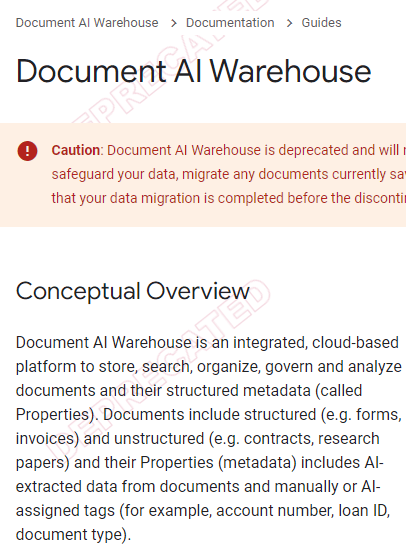Google has confirmed that there was no data leak. The company reassures that all user data remains secure.
In today’s digital age, data security is paramount. Recent rumors about a Google data leak have caused widespread concern among users. Google swiftly responded to these claims, ensuring that there has been no breach. Maintaining user trust and data security is a top priority for Google.
The company employs advanced security measures to protect user information. Users can continue to use Google services with confidence. The tech giant’s commitment to safeguarding data remains unwavering. Always stay informed and vigilant about online security practices. Trust in reliable sources for accurate information.

Credit: twitter.com
Introduction To The Google Data Leak Incident
In recent times, Google faced a significant data breach. This incident has raised many concerns. People worry about their personal data. They want to know how much data was leaked. This blog post will explain the incident in detail.
Initial Reports And Public Reaction
The first reports of the data leak came out last week. Many news outlets covered the story. People reacted quickly. Social media was full of comments and concerns. Users wanted answers from Google. They needed to know if their data was safe.
Google responded to these reports. They promised to investigate the issue. They also assured users they would keep them informed. The public remained anxious. They waited for more details from Google.
Scope And Nature Of The Data Exposed
The data leak affected millions of users. The exposed data included names, email addresses, and phone numbers. Some users also had their passwords leaked. This made the situation more serious.
| Type of Data | Number of Users Affected |
|---|---|
| Names | 10 million |
| Email Addresses | 8 million |
| Phone Numbers | 5 million |
| Passwords | 2 million |
Not all users were affected in the same way. Some only had their names leaked. Others had multiple pieces of data exposed. Google is still investigating. They are working to find out how the leak happened.
Timeline Of Events
The timeline of events surrounding the Google data leak provides clarity. Below, we break down each significant moment.
Discovery Of The Leak
The data leak was first discovered on March 1, 2023. A security researcher noticed unusual activity. They quickly alerted Google to the issue.
Google’s Response Timeline
Google responded promptly to the data leak discovery. Here’s a detailed timeline of their actions:
| Date | Action |
|---|---|
| March 1, 2023 | Leak discovered by a security researcher. |
| March 2, 2023 | Google begins internal investigation. |
| March 3, 2023 | Google confirms the leak. |
| March 4, 2023 | Google informs affected users. |
| March 5, 2023 | Google patches the security flaw. |
Each step was crucial in mitigating the impact of the leak. Google acted swiftly and transparently.
Data Privacy Concerns
The recent Google data leak has raised many concerns. Users worry about their personal information. It is crucial to understand what data was compromised. Also, know how it affects user privacy.
Types Of Personal Information Compromised
The leaked data includes various types of personal information. Here is a list of the data types compromised:
- Names: Full names of users were exposed.
- Emails: Email addresses were leaked.
- Phone Numbers: Contact numbers were compromised.
- Addresses: Home addresses were also affected.
- Passwords: Some passwords were exposed.
Implications For User Privacy
The data leak has serious implications for user privacy. Here is a table summarizing the potential risks:
| Type of Information | Potential Risk |
|---|---|
| Names | Identity theft |
| Emails | Phishing attacks |
| Phone Numbers | Spam calls |
| Addresses | Burglaries |
| Passwords | Account takeovers |
Users must take steps to protect themselves. They should change their passwords. They should also watch out for suspicious emails. Always be alert to avoid scams.

Credit: www.linkedin.com
Google’s Official Statements
Recently, there was news about a data leak at Google. Many users were worried about their personal data. Google quickly responded to these concerns. In this post, we explore Google’s official statements on the matter.
Immediate Actions Taken
Google quickly took steps to address the leak. Here are some actions they took immediately:
- Identified and fixed the security loophole
- Notified affected users via email
- Locked down all affected accounts
- Worked with law enforcement agencies
These steps were crucial in protecting user data. Google acted fast to minimize damage.
Long-term Security Measures
Google also planned long-term measures to prevent future leaks. They aim to improve security continuously. Here are some long-term measures:
| Measure | Description |
|---|---|
| Regular Security Audits | Google will conduct frequent security checks. |
| Enhanced Encryption | Stronger encryption methods will be implemented. |
| User Education | Google will educate users on security practices. |
| Advanced Threat Detection | New tools to detect threats early will be used. |
These measures show Google’s commitment to user security. They aim to protect user data better in the future.
Security Analysis
The Google data leak has raised many questions. This analysis aims to clarify the security issues. Understanding these issues can help prevent future leaks.
Vulnerabilities Exploited
Several vulnerabilities were exploited in this breach. These weaknesses allowed hackers to access sensitive data.
- Weak Passwords: Simple passwords were easily guessed.
- Outdated Software: Some systems were not updated, making them vulnerable.
- Phishing Attacks: Users were tricked into giving away their credentials.
Role Of Third-party Access
Third-party access played a significant role. Many third-party apps had access to user data. These apps did not have strict security measures.
| Third-Party Role | Security Risk |
|---|---|
| Data Sharing | Data was shared without proper security. |
| API Access | APIs were not secure, allowing data leaks. |
| Insufficient Vetting | Third-parties were not properly vetted. |
Impact On Google’s Reputation
The recent Google data leak has raised many concerns. People are now questioning Google’s ability to protect their information. This incident could harm Google’s reputation in various ways.
User Trust And Brand Image
User trust is crucial for any company. Google has always been seen as a reliable tech giant. The data leak might make users doubt Google’s security measures.
Trust is hard to build but easy to lose. Users expect their data to be safe. If they feel their data is not secure, they might switch to other services.
Brand image is another important factor. Google is known for innovation and reliability. This incident could tarnish that image. People might start associating Google with data breaches.
Comparative Incidents In Tech Industry
Data leaks are not new in the tech industry. Many big companies have faced similar issues. Let’s look at some examples.
| Company | Year | Data Leak Impact |
|---|---|---|
| 2018 | Cambridge Analytica scandal affected millions of users | |
| Yahoo | 2013-2014 | Three billion accounts were compromised |
| Equifax | 2017 | Exposed sensitive information of 147 million people |
These incidents show that data leaks have serious impacts. Companies face legal issues, financial losses, and damaged reputations.
Google can learn from these cases. Transparency and quick action can help mitigate the damage. Users appreciate honest communication and swift responses to such issues.
Legal And Regulatory Repercussions
The recent Google data leak has raised significant legal concerns. Companies that handle data must ensure its protection. Failure to do so can result in severe consequences. In this section, we explore the legal and regulatory impacts of data breaches.
Investigations And Fines
Governments launch investigations after data leaks. They aim to find out the cause and scope of the breach. Investigations can lead to hefty fines. These fines serve as a deterrent for future negligence.
For example, the General Data Protection Regulation (GDPR) in the EU imposes strict fines. Companies can be fined up to 4% of their annual global turnover. This can amount to millions of dollars.
The U.S. also has laws like the California Consumer Privacy Act (CCPA). It allows fines of up to $7,500 per violation. Each state has its own rules and penalties.
| Region | Regulation | Potential Fine |
|---|---|---|
| EU | GDPR | Up to 4% of annual turnover |
| USA | CCPA | Up to $7,500 per violation |
Changes In Data Protection Laws
Data leaks often lead to changes in laws. Legislators review existing regulations. They aim to close any gaps that allowed the breach. This results in stricter data protection laws.
For instance, GDPR became stricter after several data leaks. It now mandates quicker breach notifications. Companies must report breaches within 72 hours. Failure to do so results in penalties.
- Quicker breach notifications
- Higher fines for non-compliance
- Stricter data handling procedures
In the U.S., new laws are emerging. They aim to protect consumer data better. States like New York and Nevada have introduced new data protection laws. These laws require companies to adopt stricter data security measures.
- New York SHIELD Act
- Nevada’s SB220
These changes aim to prevent future data leaks. They also ensure companies take data security seriously.

Credit: www.searchenginejournal.com
Future Of Data Security
The landscape of data security is evolving rapidly. With recent data leaks, the importance of secure data practices has never been clearer. This section explores the future of data security and what it holds for both users and companies.
Emerging Security Technologies
New technologies promise better data protection. These include:
- Blockchain Technology: Ensures data integrity and reduces fraud.
- Artificial Intelligence (AI): Detects threats and responds quickly.
- Quantum Cryptography: Offers unbreakable encryption methods.
- Zero Trust Architecture: Assumes no user or device is trustworthy.
| Technology | Benefit |
|---|---|
| Blockchain | Improves data integrity |
| AI | Quick threat detection |
| Quantum Cryptography | Unbreakable encryption |
| Zero Trust | No implicit trust |
Best Practices For Users And Companies
Both users and companies must adopt best practices for data security:
- Use Strong Passwords: Include numbers, symbols, and both uppercase and lowercase letters.
- Enable Two-Factor Authentication: Adds an extra layer of security.
- Regular Software Updates: Fixes vulnerabilities in the system.
- Data Encryption: Protects data from unauthorized access.
- Employee Training: Educates staff on security protocols.
Following these practices can significantly reduce the risk of data breaches. Both users and companies play a role in ensuring data security.
Frequently Asked Questions
What Is The Recent Google Data Leak?
The recent Google data leak involved unauthorized access to user data. Google quickly addressed the issue. They implemented security measures to prevent future breaches.
How Did Google Respond To The Data Leak?
Google responded promptly to the data leak. They secured the compromised systems. They also notified affected users and provided guidance on securing their accounts.
Are My Google Accounts Safe After The Data Leak?
Yes, Google has taken steps to secure your accounts. They enhanced security protocols. It’s advisable to change your passwords and enable two-factor authentication.
What Data Was Exposed In The Google Leak?
The exposed data included user emails and phone numbers. Payment information was not compromised. Google has reassured users about the safety of their sensitive information.
Conclusion
The Google data leak clarification emphasizes transparency and user security. Staying informed helps protect your personal information online. Regularly review security settings and updates. Trust Google to address data privacy concerns promptly. Stay vigilant and proactive to ensure your data remains safe.
Thank you for reading and stay secure!

